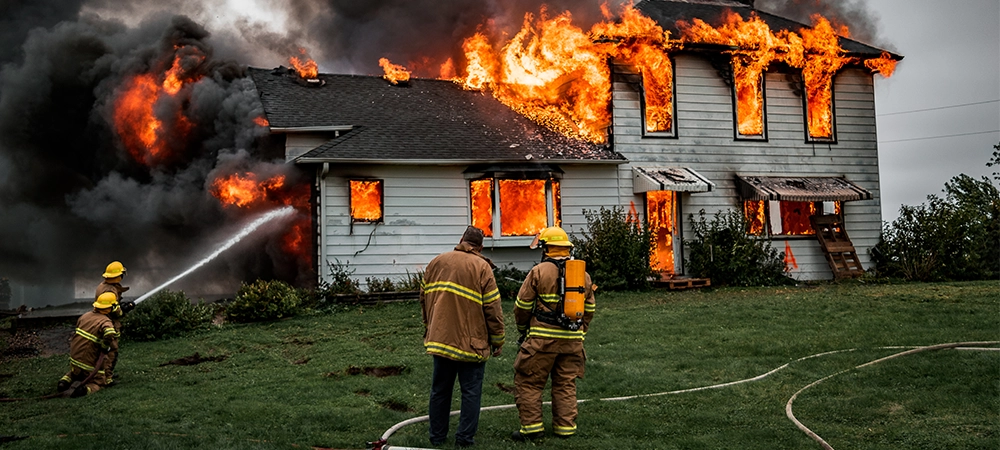Home insurance in Toronto is there to help you if anything goes wrong with your property. However, it’s best to ensure your home is protected as best as possible to avoid ever needing to worry about house insurance.
Not only is dealing with damage stressful, but making a claim through your home insurance can mean paying a deductible and having a higher premium on renewal. Here, we look at the best ways to keep your property protected.
Common Claims and How to Protect Your Property
Let’s check out six common house insurance claims in Toronto and how you can reduce their impact!
1. Storm Damage
Sadly, we still haven’t been able to control the weather, which means your home will be subjected to storms from time to time. Often, the problem is going to be from high winds, but there can be other issues, too, such as hail.
While we can’t control the weather, we do know when a storm is coming. Before a storm, it’s a good idea to inspect your property. Check to see if there is anything loose, such as roof tiles or sidings. If so, try to get them fixed or secured before the storm.
Also, before high winds, you’ll want to check to see if there is anything that can be blown away. For example, you may want to bring any patio furniture or garden equipment indoors. Trim any loose tree branches and remove any debris from the ground.
Home storm damage is often unpredictable and unavoidable, but if you take the steps above, then you have a better chance of getting through it unscathed.
2. Fire
There aren’t many more stressful things in life than a house fire. At best, they can be a big inconvenience, but at worst, they can have a severe impact on your life.
Sometimes, fires can be caused by factors outside your control, such as a faulty electrical component, but more often than not, they are accidental.
Of course, the kitchen is a common source of house fires, and it’s vital to never leave cooking unattended, especially when cooking with oil. It’s also important to know how to deal with fires, such as not putting water on a grease fire.
The simple rule is to never leave anything unattended that has an open flame. This includes candles, fireplaces, barbeques, and cigarettes. It’s also a great idea to invest in a fire extinguisher to quickly suffocate any fires if they do happen.
While open flames are important, so are your electrical circuits. Inspect your appliances and never use anything (such as a phone charger) that has a damaged wire. Added to this, ensure that you are not overloading your circuits with too many appliances on the same power strip.
3. Water Damage
Many homeowners are mindful of the risks of fire damage but neglect to be as mindful of the risk of damage from water. This can come from many areas, such as a corroded pipe, an overflowing bath, a broken appliance, or a clogged drain.
It’s a good idea to periodically do an inspection of the pipes around your property. Often, leaks will start with a small drip before becoming something much more serious. The same goes for clogged drains. Usually, you’ll notice the water passing through a little more slowly before it becomes completely clogged.
While preventative measures are important, you’ll also want to know what to do in an emergency. Due to this, you need to know where your main water shut-off valve is and make sure you can easily turn it. If they’ve not been used for a long time, these valves can often seize up.
In addition to these measures, it’s also a good idea to clean your gutters, replace old hoses, and install a sump pump/backwater valve. Also, if you’re going to be away from your home in the winter, leave the heating on low to prevent your pipes from freezing up.
4. Theft
While all of the common claims on this list are difficult to deal with, the emotional trauma of dealing with home theft can be harrowing. This is why you’ll want your home to be as protected as possible.
The easiest way to do this is by having a high-quality alarm system, but also check that your windows and doors have strong locks. Look for any weak points, and install a motion-activated light to deter criminals. If you have the budget, installing security cameras is a great extra step.
Before bedtime, it’s important to have someone in the household responsible for the routine of checking that all entryways are closed and locked. Frequently, homes can be left unlocked as both adults in the house have presumed the other one has locked up.
As tempting as it is, don’t leave keys outside for emergencies. If you do want this precaution, then either use an outside key safe or leave a spare key with a trusted neighbour or nearby relative.
5. Natural Disasters
There are many times when there is nothing you can do about a natural disaster, but even with these huge events, there are precautions you can take. Exactly what you can do depends on the type of disaster you’re most likely to encounter.
For example, if you have a flood warning, then you can move everything you possibly can upstairs. If there is a wildfire risk, see if it’s possible to create a firebreak outside your home. Whatever you may be up against, try to think of ways you can mitigate its impact.
6. Injuries
Finally, you need to be mindful of any accidents happening on your property, as you could be liable for them. This can be solved by inspecting your home and removing any potential hazards.
Examples of this could be debris across a pathway, cracks in your driveway, a loose handrail on your stairs, or a doormat that doesn’t have a non-slip backing. Also, consider the impact of weather events, such as ice on your pathways.
Final Thoughts
Claiming on home insurance is never fun. Not only do you need to go through the process, but it means something has gone badly wrong with your property. While some damage is unavoidable, many other types are preventable. If you take the precautions above, then you’ll have a much higher chance of having an accident-free home.







This article provides an excellent explanation of the most frequently reported claims for homeowners, such as water damage, fire damage and theft. It also offer useful tips to avoid these types of incidents or to minimize their effects if they occur.
One of the most helpful sections of the blog is “Protecting Your Property,” where you provide a list of simple and practical steps that homeowners can take to safeguard their home against damage, such as regularly inspecting and maintaining plumbing and electrical systems, installing smoke alarms and security alarms and keeping it’s exterior neat and well-kept.
Overall, I found this blog to be an invaluable resource for homeowners in Toronto as well as the greater area looking for ways to safeguard their property and prepare for unexpected events. The writer seems to be an expert in the insurance industry; their expert advice and tips should prove beneficial when looking to safeguard your home and belongings. I highly recommend this resource to any homeowner living in the greater Toronto area looking for ways to make sure they are adequately insured against property damage.
Thank you for taking the time to read our blog and for sharing your positive feedback, Mia!
At Buckler insurance company, we strive to provide valuable resources and information to our clients and the general public to help them protect their homes and belongings. We understand that unexpected events can happen at any time and it’s important to be prepared for them. We’re glad to hear that you found our tips and advice to be practical and helpful.
Our goal is to empower homeowners to take proactive steps to safeguard their property and avoid common incidents that can lead to insurance claims. We appreciate your recommendation and hope that our blog will continue to be a useful resource for you and other homeowners in the greater Toronto area!